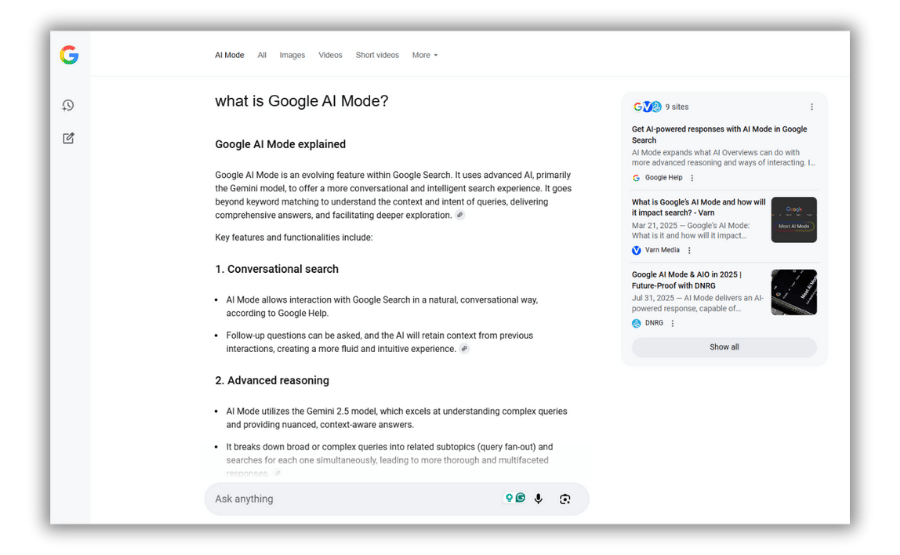Is AI Killing SEO? The short answer is no, but artificial intelligence is reshaping how we approach search engine optimisation (SEO). As AI tools like Google’s Search Generative Experience (SGE) and ChatGPT become integral to how people search, they’re rewriting the rules of visibility and changing how users interact with search results, prompting businesses to rethink how they structure, optimise, and present content online.
As we answer this question, we’ll explain why SEO is far from dead and how it must continue to evolve to remain effective in the age of AI. We’ll look at how SEO strategies can adapt to stay relevant with AI Overviews dominating Google search results, and offer insight into how businesses can benefit from AI and SEO working together.
Need help navigating the future of SEO? At britweb, we offer bespoke SEO services and broader digital marketing services that combine the best of traditional SEO with cutting-edge AI insights.
The impact of AI on search behaviour
Search is no longer just a list of links; it’s answers, summaries, and conversation. With AI tools like Google’s Search Generative Experience (SGE), users now receive instant, AI-generated answers directly in the search results. This means fewer people are clicking through to websites. According to Similarweb, around 60% of searches end without a click – a trend likely to accelerate as AI Overviews become more prominent in search results.
This shift is transforming how search works. Traditional SEO factors like quality content, technical performance, and domain authority still matter, but they now operate in a new environment. One where visibility depends not just on ranking high in search engine results, but on being cited and summarised by large language models (LLMs) – AI systems trained to generate human-like responses in real time.
To stay visible, brands must evolve their approach. That means optimising not just for rankings, but for AI visibility, ensuring your content is structured, authoritative, and easy for AI to understand and reuse. Businesses that succeed in this landscape won’t abandon SEO – they’ll adapt it to work within both traditional search engines and the AI-powered discovery layer that’s changing how people find information.
To learn more about the current landscape, read our guide on ‘Understanding the Effect of AI Overviews‘.

How SEO is adapting to AI
Traditional SEO practices like keyword research, technical performance, and link building are still critical, but to stay visible in today’s changing landscape, those foundations must now work alongside new considerations for AI-generated results.
Here’s how SEO is evolving:
| Core SEO Principle | AI-Driven Focus Area | How SEO & AI Intersect |
|---|---|---|
| Keyword optimisation | Natural language, semantic search, AI-generated phrasing | Traditional keyword research informs AI-friendly language choices |
| Technical SEO (e.g. site speed, markup) | Schema markup, structured content for LLM readability | Structured, clean code supports both crawling and AI summarisation |
| Content relevance and quality | Content formatted for summarisation, clarity, and FAQs | Clear, well-organised content increases the chances of citation in AI results |
| Link building & authority | Topical depth, consistency, E-E-A-T signals for AI confidence | Authority helps rank in search engine results and builds trust with AI systems |
| User engagement and Click-Through-Rate | Zero-click visibility, brand mentions in conversational platforms | CTR is still relevant, but now includes AI mentions and citations |
| Google-centric optimisation | Optimisation across SGE, ChatGPT, Bing AI, and voice search | A broader, multi-platform approach ensures visibility across interfaces |
Rather than killing SEO, AI is expanding what good SEO needs to include. The fundamentals still apply, but they must now serve both traditional search engines and a new layer of AI-powered discovery. The challenge for businesses and marketers is ultimately learning how to balance both.
With those shifts in mind, here’s how to refocus your SEO strategy to stay ahead.
Strategic focus areas for modern SEO
To remain effective in a search environment shaped by AI, SEO strategies must bridge the gap between traditional ranking factors and new methods that improve visibility. These four focus areas highlight where SEO strategies can evolve, followed by some practical tips.
1. Blend traditional SEO with AI-focused optimisation
As mentioned, classic search engine optimisation still matters, but it now coexists with AEO (Answer Engine Optimisation), GEO (Generative Engine Optimisation), and AIO (Artificial Intelligence Optimisation), new techniques that target how AI tools and LLMs retrieve, prioritise, and deliver information. This helps ensure your site can rank in both traditional search results and AI results.
2. Optimise for user intent and AI comprehension
AI tools reward content that directly addresses user intent. Structuring pages around clear questions, concise answers, and scannable formats (like bullet points and FAQs) increases the chances of being cited in AI-generated summaries, whether the user is on Google Search, ChatGPT, or Bing.
3. Prioritise topical authority and structured content
Your ability to appear in AI-generated answers depends on your authority in a subject area. This involves consistent content creation, strong internal linking, and rich data. Tools like schema markup help streamline processes by giving search engines clear context, which is essential for staying visible in AI search environments.
Take a look at our guide on ‘How to Create A Topical Authority Map‘ for more insight.
4. Track and optimise for AI visibility
Just as we track search engine rankings, SEOs must now also track how often their content appears in AI results. New analytics tools allow marketers to monitor AI citations, search visibility, and follow-up questions triggered by AI summaries.
Practical optimisation tips for content
Here are some hands-on ways to optimise your content to support both traditional SEO and AI visibility.
- Start each page with a clear TL;DR or summary: This helps both users and AI algorithms quickly understand the value of your content and improves your chances of being cited or summarised in AI overviews.
- Add FAQs that align with real search queries: Match content to “People Also Ask” and conversational search terms to boost relevance in AI-driven answers and featured snippets.
- Use structured data (schema markup) throughout your site: Enhance your content’s machine readability to gain visibility in AI search results and rich snippets in traditional search engines.
- Refresh your keyword strategy regularly: Stay in tune with user behaviour and emerging search trends by monitoring AI platform prompts, voice search queries, and long-tail keywords.
- Balance AI assistance with human creativity: Use AI to identify patterns and speed up production, but keep human input central for tone, context, and emotional resonance.
- Optimise for zero-click and low-click environments: Design content to answer questions immediately, provide value upfront, and offer opportunities for follow-up interaction.
- Focus on content that demonstrates expertise, experience, authority, and trust (E-E-A-T): AI is trained to present content that reflects depth and reliability, qualities that are still best conveyed by real people.
At britweb, we have a talented team delivering content marketing services to our clients.
How AI can support SEO
More than just keeping up, when applied thoughtfully, AI can streamline workflows and enhance decision-making. Below are practical ways to integrate AI into an SEO strategy. These actions combine the strengths of AI tools with the irreplaceable value of human creativity, user-focused thinking, and content relevance.
| Action | Process | Benefits |
|---|---|---|
| Enhance Research | Use AI tools to analyse keywords, search trends, and content gaps | Faster keyword discovery, stronger content planning, and better alignment with user search behaviour |
| Align Content with User Intent | Map content to search intent stages using AI prompts and related queries | Produces more targeted, helpful content and boosts relevance in both traditional and AI search |
| Streamline SEO Workflow | Partially automate tasks like technical audits, competitor analysis, and content brief creation | Saves time, boosts productivity, and ensures consistent SEO efforts |
By approaching AI as a support system, an SEO strategy can become more resilient, responsive, and future-ready. It allows businesses to create content that performs well in both traditional search engines and modern AI-driven platforms, without sacrificing tone, creativity, or audience connection.
Summary: SEO isn’t dead – it’s evolving
AI isn’t killing SEO – it’s evolving it. As search engines become more conversational and generative, traditional SEO tactics like keyword optimisation, technical health, and authority-building remain essential, but they’re no longer the whole picture.
To stay competitive, brands must optimise for both human users and AI systems. That means understanding how large language models present information, designing content for zero-click environments, and measuring success in new ways, like citations in AI-generated answers.
In this new landscape, SEO is no longer just about climbing SERP rankings; it’s about being discoverable across a wider ecosystem of traditional and AI-powered discovery tools.
Contact britweb for tailored SEO strategies
If you’re struggling to keep pace with the sheer volume of changes, especially those driven by Google’s AI and other AI search experiences, don’t worry. At britweb, our expert team can help you build a modern, AI-enhanced SEO plan that not only helps to ensure your search engine visibility but also prepares your business for what’s next.
To rank higher, remain visible, and stay ahead of the curve contact us today.
AI and SEO FAQ
Will AI kill SEO completely?
No, AI won’t kill SEO, but it is fundamentally transforming it. As AI search tools become more prominent, SEO is shifting from purely ranking-focused strategies to ones that prioritise visibility within AI-generated content. Rather than replacing SEO, AI demands smarter, more adaptive approaches. Brands that evolve their SEO practices can continue to thrive in this new environment.
How is Google’s AI changing search?
Google’s Search Generative Experience (SGE) introduces AI-generated answers directly within search results, reducing the need for users to click through to websites. This change is transforming how users engage with search and how businesses earn visibility and clicks. To remain visible, websites must now compete to be cited within AI overviews, not just ranked on page one. It’s a major shift in how organic search works.
Is SEO still worth investing in?
Yes, arguably more than ever. While the format of results is changing, the volume of search queries continues to grow. SEO now includes a broader range of platforms (Google, AI tools, voice assistants), but the fundamentals – creating valuable, relevant content that aligns with user needs – remain at the core.
Do I still need to focus on keyword research?
Absolutely. Keyword research is still essential for aligning your content with what users are searching for, whether via traditional search engines or AI platforms. Today’s SEO demands a deeper understanding of user intent, long-tail queries, and natural language. AI tools can help accelerate production, but human input is essential for tone, context, and creating meaningful user connections.
Should I change how I create content?
To succeed in today’s environment, content needs to be both AI-compatible and genuinely helpful to users. That means using clear structure, natural language, and formats like FAQs and summaries, while also telling stories and delivering value that resonates. AI tools can assist, but your voice and insight are what will set your content apart.
Can AI fully replace SEO professionals?
No, while AI can process and analyse data at scale, it lacks the human creativity, strategic thinking, and contextual awareness needed to craft a strong SEO strategy. AI tools can support tasks like audits or topic research, but they can’t replicate experience-driven decision-making. User experience, tone, brand voice, and content relevance still rely heavily on human expertise.


